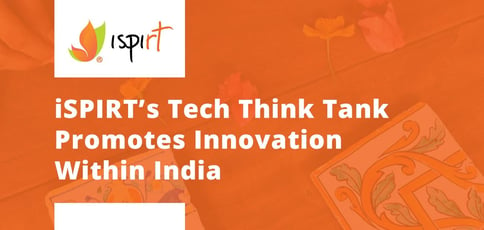
TL; DR: iSPIRT is a nonprofit think tank devoted to building public goods that allow Indian product startups to thrive. By creating a fertile environment for a new generation of India-based software products, the organization aims to facilitate data-driven governance, boost small business productivity, and connect communities. Through advocacy efforts, playbooks, and market catalysts, iSPIRT’s volunteers are working to achieve long-term change in India.
Global Positioning System (GPS) technology has become an integral part of modern life, eliminating the risk of getting lost on the road and spurring innovations in food delivery services and ride-hailing companies.
But the technology didn’t evolve into its current form until the Defense Advanced Research Projects Agency (DARPA), part of the United States Department of Defense (DOD), miniaturized GPS receivers to assist military forces. The groundbreaking development made it easier for soldiers to attack and eliminate challenging targets from greater distances. It also paved the way for consumer and commercial use of the technology.
“DARPA essentially created a scalable public infrastructure with GPS that opened up new market playgrounds,” said Karthik KS, Volunteer In Residence at the Indian Software Product Industry Roundtable (iSPIRT). “This had a multiplier effect in terms of innovation, facilitating the creation of companies like DoorDash, Instacart, Uber, and Uber Eats.”

Karthik KS, Volunteer In Residence, gave us the scoop on the Indian Software Product Industry Roundtable (iSPIRT).
Karthik told us that India doesn’t have the infrastructure for advanced civilian applications — and iSPIRT was created to address that problem. The nonprofit think tank aims to do for Indian product startups what DARPA did for U.S. tech markets.
iSPIRT’s goal is to provide Indian startups with multiple types of public resources: technical building blocks, startup-friendly policies, market access programs, and playbooks that contain tactical knowledge for entrepreneurs.
By creating an environment ripe for a new generation of Indian software products, the nonprofit aims to boost small business productivity, encourage data-driven governance, and connect communities.
“We want to make India a great nation that not just builds world-class software products but also exports them,” Karthik said.
Helping Entrepreneurs Spur Innovation within the Country
Karthik told us that during the past 30 years or so, Indian developers have pushed the boundaries of technological innovation, both building and running some of the largest companies in the global market. And while multinational companies frequently acquire talent from the country, tech startups based in India are few and far between.
“We’re not harnessing the talent in India,” Karthik said. “Many people work for large global companies and eventually move away. Few stay back building world-class products out of India. We’ve been noticing this pattern for a long time.”
Karthik told us the problem is widespread, with Indians relying on foreign suppliers for everything from clothing to technology. In 2017, India imported $417 billion in goods, becoming the 11th largest importer in the world. That year, the nation’s imports came primarily from China ($68.8 billion), the United States ($22.8 billion), the United Arab Emirates ($22.1 billion), Switzerland ($20.9 billion), and Saudi Arabia ($19.4 billion).

iSPIRT is working to achieve long-term change in India via a thriving software product industry.
“We are in a country that has been completely oriented around the service industry but never around the software industry,” Karthik said. “If you visit any basic grocery store, known as kiranas, you will notice they are not completely tech-enabled. And, out of a population of approximately 1.3 billion, we only have around 600 million people on smartphones. So we have a lot of opportunities.”
Karthik told us iSPIRT began its mission identifying these gaps in the market. Now, the nonprofit is using that information to foster a fertile entrepreneurial environment that can be used to solve some of India’s most pressing problems.
Providing Tactical Playbooks and Technical Building Blocks
One of iSPIRT’s first endeavors was the creation of playbooks for product entrepreneurs. These resources provide guidance on how startups can thrive within the Indian market, whether they’re looking to bootstrap their operations or seek funding.
“Playbooks provide basic information about how to thrive as an entrepreneur in India, covering everything from finances to marketing and sales,” Karthik said. “Our market is very different from the U.K. or those in the West. We want to show them how to create software products and brand themselves in a way that will disrupt the marketplace.”
In addition to supplying tactical guides, iSPIRT is working to provide the technological building blocks local entrepreneurs need to create the next generation of Indian software products. Karthik told us the organization decided to start with financial markets.
“India is a very poor country,” he said. “We have had to rely on foreign aid for a long time. But we believe that, if our livelihood is to improve, we have to either get generous with basic income or make capital more accessible for individuals and businesses to grow.”
To make it easier to distribute subsidies to impoverished citizens, the Open API team at iSPIRT worked as a pro-bono partner in the development, growth, and promotion of IndiaStack. The resulting APIs provide developers, startups, small businesses, and governments with the digital infrastructure to facilitate remote, paperless, and cashless service delivery. The technology has four distinct layers, including a universal biometric digital identity.
“Because of the identity layer called Aadhaar, we can now verify whether someone is a beneficiary,” Karthik told us. “Then we can start providing services. We found that this infrastructure works well at scale for delivering these social benefits and also for private innovation, which is happening today around rental agreements and other solutions.”
Advocacy Efforts, Market Catalysts, and a Long-Term Vision for India
iSPIRT is powered by a core group of full-time volunteers who make a modest living wage, though some don’t even accept the entire salary they are entitled to. Other mission-based volunteers are unpaid but seek growth opportunities that force them to step outside of their comfort zones.
Karthik said the iSPIRT volunteer fellowship serves in a similar capacity as an MBA.
“It’s not just about sharpening your skills and getting to know people,” he said. “It’s also about discovering yourself. For example, if you’re an engineer, you’re doing it to work on building engineering infrastructure. There are multilayer opportunities that arise for each individual.”
iSPIRT has a 30-year vision for helping India thrive through a growing software product industry.
“It is not a small vision,” he said. “In the process, of course, volunteers will come in, governments will change, bureaucrats will change. But our intentions will remain the same: to make India proud.”
As part of its advocacy mission, iSPIRT works to educate government policymakers and other stakeholders on how a vibrant software industry can benefit India’s future. The nonprofit believes that the primary focus of policy should be to provide the social, legal, and economic infrastructure that startups need to flourish.
In addition to advocacy, iSPIRT strives to create open-access market catalysts designed to improve merger and acquisition deals, both for entrepreneurs interested in an exit strategy and established businesses looking to gain access to cutting-edge technologies.
Opportunities on the Horizon for Processing and Storing Data
iSPIRT is creating its own framework for data privacy and sharing as the tech industry sees demand for cloud storage and infrastructure increase and privacy regulations, such as the General Data Protection Regulation (GDPR), multiply.
“We call it our Data Empowerment and Protection Architecture,” Karthik said. “There are no regulations in India for how or where you process data. We are working on processing the data, extracting the value out of it, and funneling that value back to the individual to provide better service.”
The group is also working on tools to democratize credit in India with a second layer to the platform that will function as a real-time underwriting facility.
“There is no good credit rating infrastructure in India,” Karthik said. “iSPIRT has chosen this path not just to help the government but also to kick-start new public and private innovation.”
HostingAdvice.com is a free online resource that offers valuable content and comparison services to users. To keep this resource 100% free, we receive compensation from many of the offers listed on the site. Along with key review factors, this compensation may impact how and where products appear across the site (including, for example, the order in which they appear). HostingAdvice.com does not include the entire universe of available offers. Editorial opinions expressed on the site are strictly our own and are not provided, endorsed, or approved by advertisers.
Our site is committed to publishing independent, accurate content guided by strict editorial guidelines. Before articles and reviews are published on our site, they undergo a thorough review process performed by a team of independent editors and subject-matter experts to ensure the content’s accuracy, timeliness, and impartiality. Our editorial team is separate and independent of our site’s advertisers, and the opinions they express on our site are their own. To read more about our team members and their editorial backgrounds, please visit our site’s About page.

